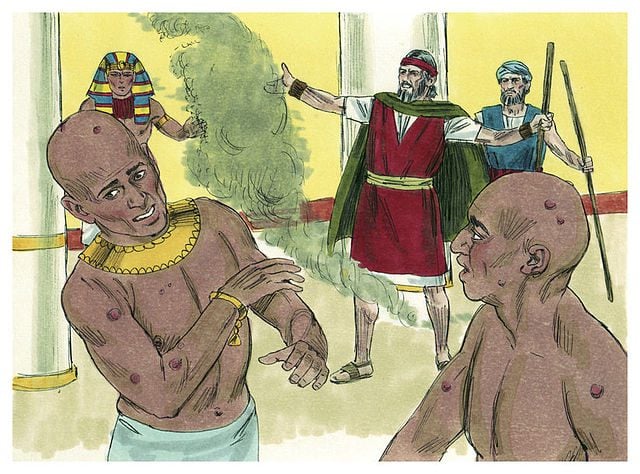
Yes He does:
Exodus 9:8-11 (RSV) And the LORD said to Moses and Aaron, “Take handfuls of ashes from the kiln, and let Moses throw them toward heaven in the sight of Pharaoh. [9] And it shall become fine dust over all the land of Egypt, and become boils breaking out in sores on man and beast throughout all the land of Egypt.” [10] So they took ashes from the kiln, and stood before Pharaoh, and Moses threw them toward heaven, and it became boils breaking out in sores on man and beast. [11] And the magicians could not stand before Moses because of the boils, for the boils were upon the magicians and upon all the Egyptians.
Exodus 15:26 . . . “If you will diligently hearken to the voice of the LORD your God, and do that which is right in his eyes, and give heed to his commandments and keep all his statutes, I will put none of the diseases upon you which I put upon the Egyptians; for I am the LORD, your healer.”
Deuteronomy 7:15 And the LORD will take away from you all sickness; and none of the evil diseases of Egypt, which you knew, will he inflict upon you, but he will lay them upon all who hate you.
Genesis 12:17 But the LORD afflicted Pharaoh and his house with great plagues because of Sar’ai, Abram’s wife.
Leviticus 26:21 Then if you walk contrary to me, and will not hearken to me, I will bring more plagues upon you, sevenfold as many as your sins.
2 Chronicles 21:18-19 And after all this the LORD smote him in his bowels with an incurable disease. [19] In course of time, at the end of two years, his bowels came out because of the disease, and he died in great agony. (cf. 21:15)
2 Chronicles 21:12-14 And a letter came to him from Eli’jah the prophet, saying, “Thus says the LORD, the God of David your father, `Because you have not walked in the ways of Jehosh’aphat your father, or in the ways of Asa king of Judah, [13] but have walked in the way of the kings of Israel, and have led Judah and the inhabitants of Jerusalem into unfaithfulness, as the house of Ahab led Israel into unfaithfulness, and also you have killed your brothers, of your father’s house, who were better than yourself; [14] behold, the LORD will bring a great plague on your people, your children, your wives, and all your possessions,
Numbers 11:33 While the meat was yet between their teeth, before it was consumed, the anger of the LORD was kindled against the people, and the LORD smote the people with a very great plague.
Isaiah 10:16 Therefore the Lord, the LORD of hosts, will send wasting sickness among his stout warriors, . . .
2 Kings 15:5 And the LORD smote the king, so that he was a leper to the day of his death, . . . (cf. 2 Chr 13:20)
Acts 12:23 Immediately an angel of the Lord smote him, because he did not give God the glory; and he was eaten by worms and died.
2 Kings 6:18 And when the Syrians came down against him, Eli’sha prayed to the LORD, and said, “Strike this people, I pray thee, with blindness.” So he struck them with blindness in accordance with the prayer of Eli’sha.
2 Maccabees 9:4-6 . . . But the judgment of heaven rode with him! For in his arrogance he said, “When I get there I will make Jerusalem a cemetery of Jews.” [5] But the all-seeing Lord, the God of Israel, struck him an incurable and unseen blow. As soon as he ceased speaking he was seized with a pain in his bowels for which there was no relief and with sharp internal tortures — [6] and that very justly, for he had tortured the bowels of others with many and strange inflictions.
Numbers 12:9-11 And the anger of the LORD was kindled against them, and he departed; [10] and when the cloud removed from over the tent, behold, Miriam was leprous, as white as snow. And Aaron turned towards Miriam, and behold, she was leprous. [11] And Aaron said to Moses, “Oh, my lord, do not punish us because we have done foolishly and have sinned.
Romans 1:27 and the men likewise gave up natural relations with women and were consumed with passion for one another, men committing shameless acts with men and receiving in their own persons the due penalty for their error.
1. God says: don’t do x, because it’s sinful (because He knows the consequences will be bad for them).
2. People do x anyway.
3. They then receive ” in their own persons the due penalty.”
Therefore God gave them up in the lusts of their hearts to impurity, to the dishonoring of their bodies among themselves, . . . For this reason God gave them up to dishonorable passions. . . . And since they did not see fit to acknowledge God, God gave them up to a base mind and to improper conduct.
In a USCCB commentary on Romans 1, it’s stated (bolding in original):
[1:24] In order to expose the depth of humanity’s rebellion against the Creator, God handed them over to impurity through the lusts of their hearts. Instead of curbing people’s evil interests, God abandoned them to self-indulgence, thereby removing the facade of apparent conformity to the divine will. Subsequently Paul will show that the Mosaic law produces the same effect; cf. Rom 5:20; 7:13–24. The divine judgment expressed here is related to the theme of hardness of heart described in Rom 9:17–18.
My thought about AIDS in particular (which was brought up) would be like all the other diseases that result from promiscuous homosexuality (and promiscuous heterosexuality): it’s the consequence of sin that God warned against; in other words, natural, not supernatural.
We know that God judged many sinful people with disease. My list of passages established that beyond doubt (including a NT one). And he judged Ananias and Sapphira with death in the NT (Acts 5:1-10). That’s not disease, but death is, one could say, “the ultimate disease.”
What we see above is not “normative” judgment. But there is a lot of judgment going on in Scripture, and with the use of disease. STDs are (mostly) the result of promiscuity or sexual acts that violate natural law (even if not promiscuous), just as there are problems when junkies share needles or a bunch of people live in unsanitary conditions. Natural results . . .
But it’s similar to judgment because the dynamic is the same:
1. God: Don’t do x.
2. We do x.
3. Oftentimes, the sin will have its own natural negative consequence.
4. Or, God judges a person supernaturally in relatively rare and extraordinary circumstances.
In both instances, God warned not to do certain things, or bad results will happen. Then the bad stuff happens, either from the laws of nature, or supernatural judgment.
Here’s an interesting passage from proverbial literature (which, of course, allows a lot of exceptions):
Psalm 107:17 Some were sick through their sinful ways, and because of their iniquities suffered affliction;
John 9:1-3 As he passed by, he saw a man blind from his birth. [2] And his disciples asked him, “Rabbi, who sinned, this man or his parents, that he was born blind?” [3] Jesus answered, “It was not that this man sinned, or his parents, but that the works of God might be made manifest in him.
Luke 12:19-20 And I will say to my soul, Soul, you have ample goods laid up for many years; take your ease, eat, drink, be merry.’ [20] But God said to him, `Fool! This night your soul is required of you; and the things you have prepared, whose will they be?’
Matthew 25:13 Watch therefore, for you know neither the day nor the hour.Matthew 24:37-44 As were the days of Noah, so will be the coming of the Son of man. [38] For as in those days before the flood they were eating and drinking, marrying and giving in marriage, until the day when Noah entered the ark, [39] and they did not know until the flood came and swept them all away, so will be the coming of the Son of man. [40] Then two men will be in the field; one is taken and one is left. [41] Two women will be grinding at the mill; one is taken and one is left. [42] Watch therefore, for you do not know on what day your Lord is coming. [43] But know this, that if the householder had known in what part of the night the thief was coming, he would have watched and would not have let his house be broken into. [44] Therefore you also must be ready; for the Son of man is coming at an hour you do not expect.*Luke 16:27-31 And he said, `Then I beg you, father, to send him to my father’s house, [28] for I have five brothers, so that he may warn them, lest they also come into this place of torment.’ [29] But Abraham said, `They have Moses and the prophets; let them hear them.’ [30] And he said, `No, father Abraham; but if some one goes to them from the dead, they will repent.’ [31] He said to him, `If they do not hear Moses and the prophets, neither will they be convinced if some one should rise from the dead.'”
***
Photo credit: Plague of boils. Biblical illustrations by Jim Padgett (1931-2009), courtesy of Sweet Publishing, Ft. Worth, TX, and Gospel Light, Ventura, CA. Copyright 1984. [Wikimedia Commons / Creative Commons Attribution-Share Alike 3.0 Unported license]
***













